Business Law Case Study: Consumer Protection and Contractual Disputes
VerifiedAdded on 2023/06/07
|9
|1700
|385
Case Study
AI Summary
This case study examines a dispute between Karen and a gym regarding her membership contract, focusing on potential violations of the Australian Consumer Law (ACL) related to misleading advertising and unfair contract terms. The analysis covers sections 18, 23, and 29 of the ACL, addressing issues of misrepresentation and the gym's right to terminate memberships while penalizing members for termination. The study also explores the common law principles of misrepresentation, particularly concerning false statements of fact that induced Karen to enter the contract. The conclusion asserts Karen's right to rescind the contract, claim damages under s 236 of the ACL, and highlights the applicability of common law misrepresentation, emphasizing that Karen is not liable for the $100 termination fee.
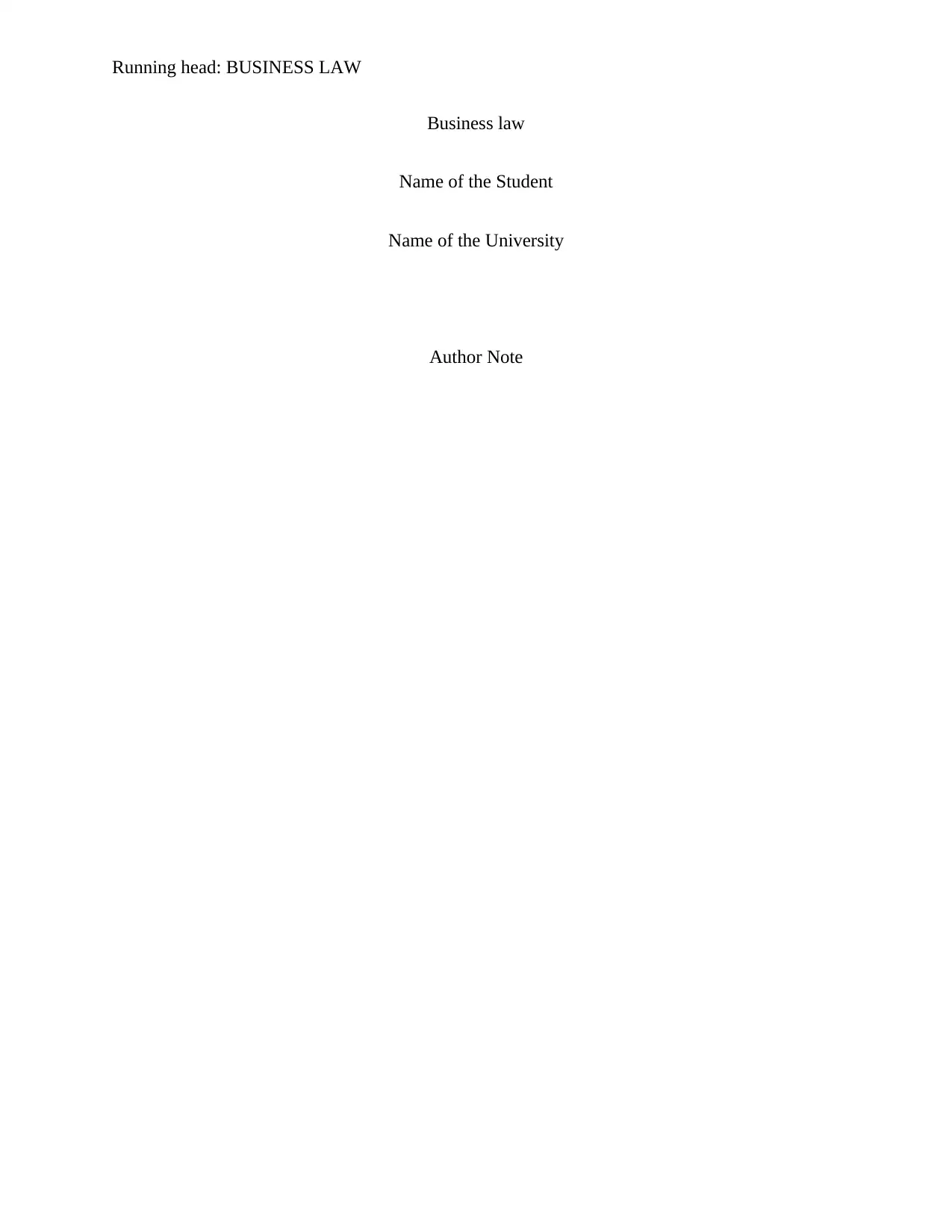
Running head: BUSINESS LAW
Business law
Name of the Student
Name of the University
Author Note
Business law
Name of the Student
Name of the University
Author Note
Paraphrase This Document
Need a fresh take? Get an instant paraphrase of this document with our AI Paraphraser
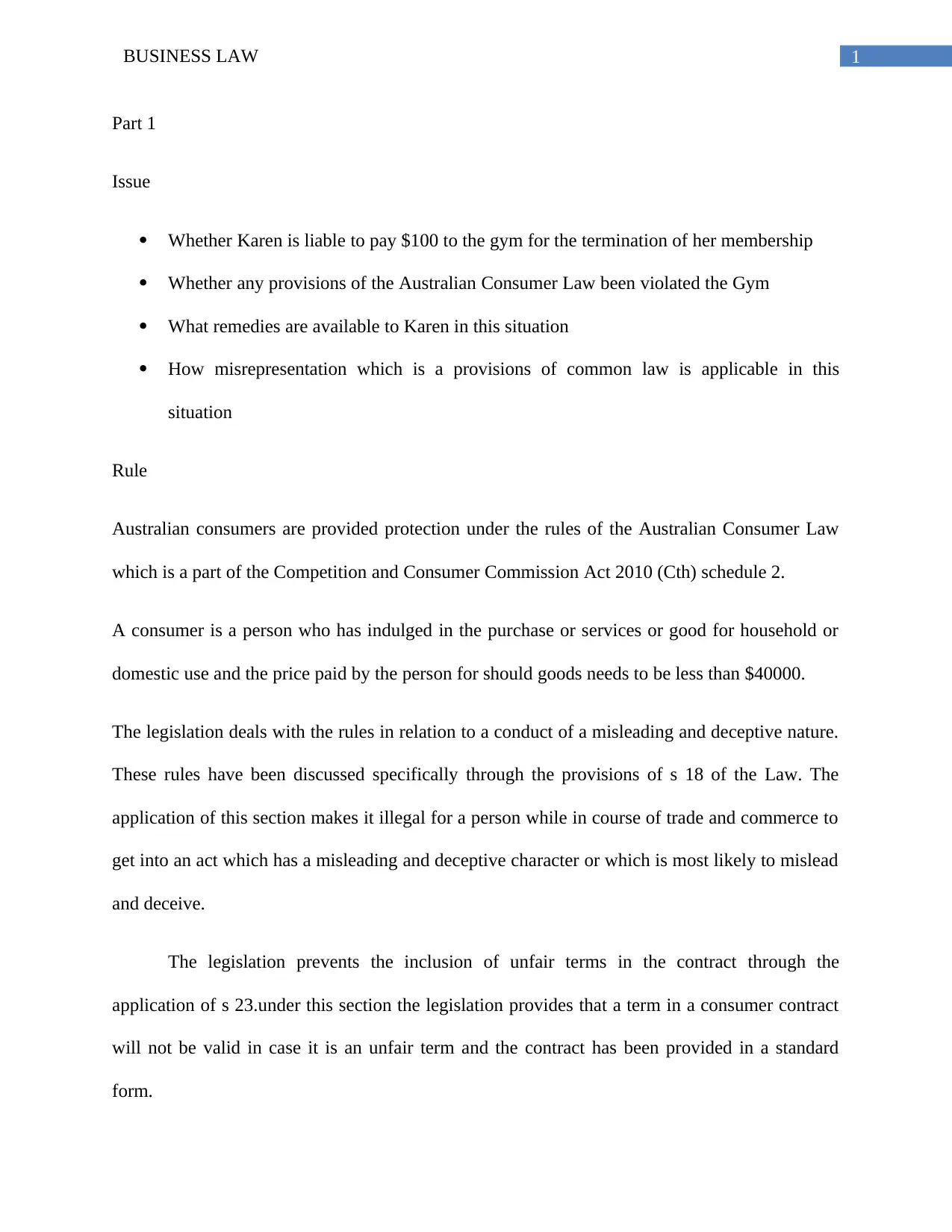
1BUSINESS LAW
Part 1
Issue
Whether Karen is liable to pay $100 to the gym for the termination of her membership
Whether any provisions of the Australian Consumer Law been violated the Gym
What remedies are available to Karen in this situation
How misrepresentation which is a provisions of common law is applicable in this
situation
Rule
Australian consumers are provided protection under the rules of the Australian Consumer Law
which is a part of the Competition and Consumer Commission Act 2010 (Cth) schedule 2.
A consumer is a person who has indulged in the purchase or services or good for household or
domestic use and the price paid by the person for should goods needs to be less than $40000.
The legislation deals with the rules in relation to a conduct of a misleading and deceptive nature.
These rules have been discussed specifically through the provisions of s 18 of the Law. The
application of this section makes it illegal for a person while in course of trade and commerce to
get into an act which has a misleading and deceptive character or which is most likely to mislead
and deceive.
The legislation prevents the inclusion of unfair terms in the contract through the
application of s 23.under this section the legislation provides that a term in a consumer contract
will not be valid in case it is an unfair term and the contract has been provided in a standard
form.
Part 1
Issue
Whether Karen is liable to pay $100 to the gym for the termination of her membership
Whether any provisions of the Australian Consumer Law been violated the Gym
What remedies are available to Karen in this situation
How misrepresentation which is a provisions of common law is applicable in this
situation
Rule
Australian consumers are provided protection under the rules of the Australian Consumer Law
which is a part of the Competition and Consumer Commission Act 2010 (Cth) schedule 2.
A consumer is a person who has indulged in the purchase or services or good for household or
domestic use and the price paid by the person for should goods needs to be less than $40000.
The legislation deals with the rules in relation to a conduct of a misleading and deceptive nature.
These rules have been discussed specifically through the provisions of s 18 of the Law. The
application of this section makes it illegal for a person while in course of trade and commerce to
get into an act which has a misleading and deceptive character or which is most likely to mislead
and deceive.
The legislation prevents the inclusion of unfair terms in the contract through the
application of s 23.under this section the legislation provides that a term in a consumer contract
will not be valid in case it is an unfair term and the contract has been provided in a standard
form.
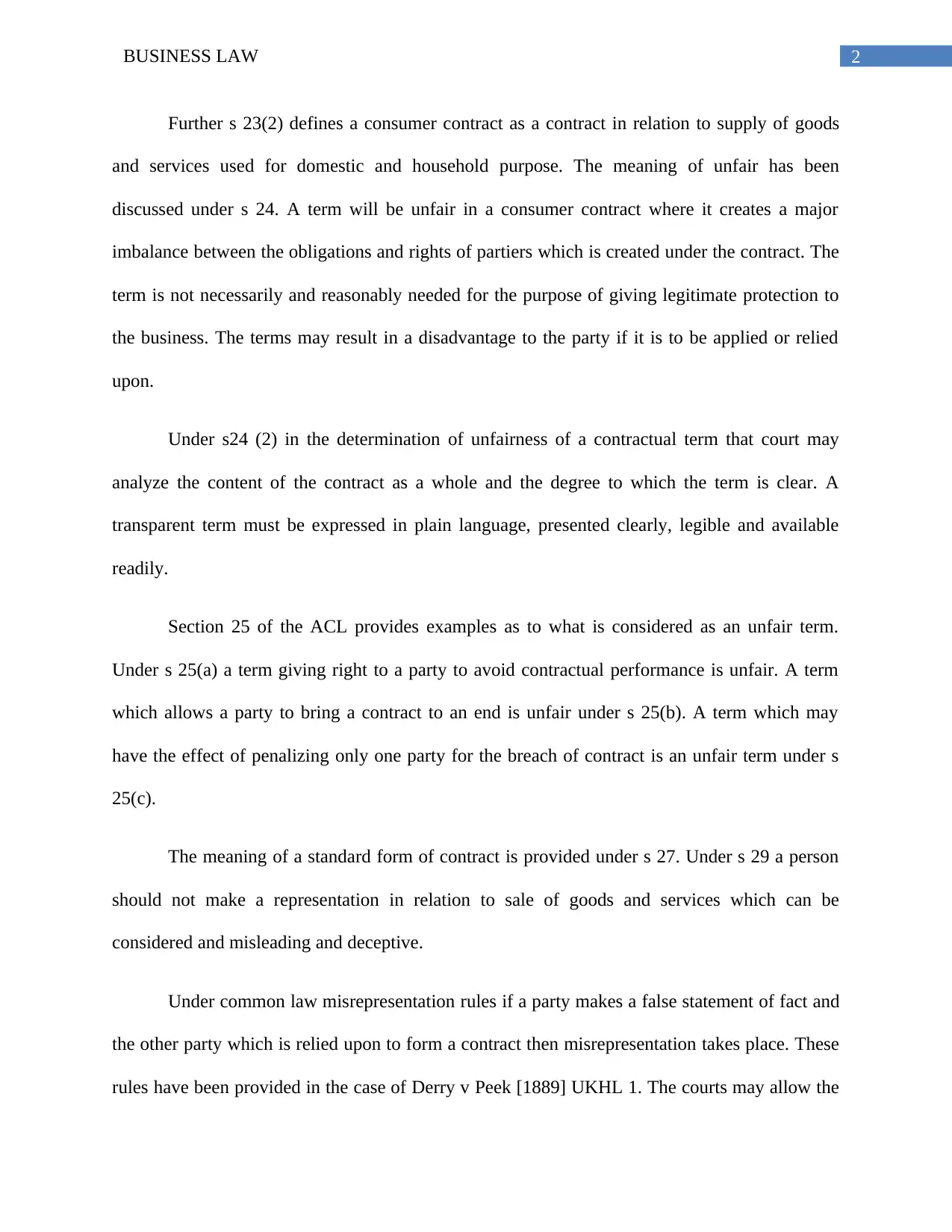
2BUSINESS LAW
Further s 23(2) defines a consumer contract as a contract in relation to supply of goods
and services used for domestic and household purpose. The meaning of unfair has been
discussed under s 24. A term will be unfair in a consumer contract where it creates a major
imbalance between the obligations and rights of partiers which is created under the contract. The
term is not necessarily and reasonably needed for the purpose of giving legitimate protection to
the business. The terms may result in a disadvantage to the party if it is to be applied or relied
upon.
Under s24 (2) in the determination of unfairness of a contractual term that court may
analyze the content of the contract as a whole and the degree to which the term is clear. A
transparent term must be expressed in plain language, presented clearly, legible and available
readily.
Section 25 of the ACL provides examples as to what is considered as an unfair term.
Under s 25(a) a term giving right to a party to avoid contractual performance is unfair. A term
which allows a party to bring a contract to an end is unfair under s 25(b). A term which may
have the effect of penalizing only one party for the breach of contract is an unfair term under s
25(c).
The meaning of a standard form of contract is provided under s 27. Under s 29 a person
should not make a representation in relation to sale of goods and services which can be
considered and misleading and deceptive.
Under common law misrepresentation rules if a party makes a false statement of fact and
the other party which is relied upon to form a contract then misrepresentation takes place. These
rules have been provided in the case of Derry v Peek [1889] UKHL 1. The courts may allow the
Further s 23(2) defines a consumer contract as a contract in relation to supply of goods
and services used for domestic and household purpose. The meaning of unfair has been
discussed under s 24. A term will be unfair in a consumer contract where it creates a major
imbalance between the obligations and rights of partiers which is created under the contract. The
term is not necessarily and reasonably needed for the purpose of giving legitimate protection to
the business. The terms may result in a disadvantage to the party if it is to be applied or relied
upon.
Under s24 (2) in the determination of unfairness of a contractual term that court may
analyze the content of the contract as a whole and the degree to which the term is clear. A
transparent term must be expressed in plain language, presented clearly, legible and available
readily.
Section 25 of the ACL provides examples as to what is considered as an unfair term.
Under s 25(a) a term giving right to a party to avoid contractual performance is unfair. A term
which allows a party to bring a contract to an end is unfair under s 25(b). A term which may
have the effect of penalizing only one party for the breach of contract is an unfair term under s
25(c).
The meaning of a standard form of contract is provided under s 27. Under s 29 a person
should not make a representation in relation to sale of goods and services which can be
considered and misleading and deceptive.
Under common law misrepresentation rules if a party makes a false statement of fact and
the other party which is relied upon to form a contract then misrepresentation takes place. These
rules have been provided in the case of Derry v Peek [1889] UKHL 1. The courts may allow the
⊘ This is a preview!⊘
Do you want full access?
Subscribe today to unlock all pages.

Trusted by 1+ million students worldwide
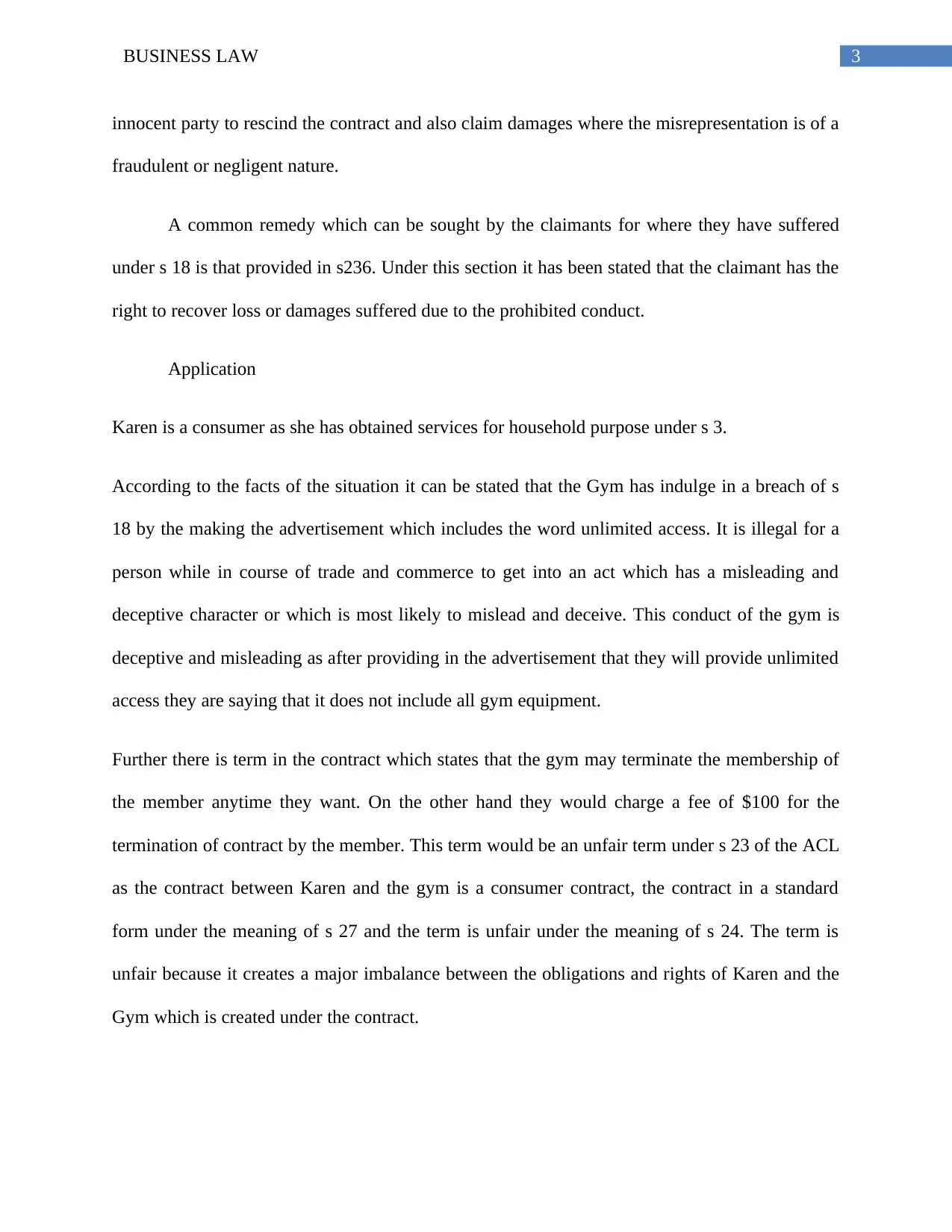
3BUSINESS LAW
innocent party to rescind the contract and also claim damages where the misrepresentation is of a
fraudulent or negligent nature.
A common remedy which can be sought by the claimants for where they have suffered
under s 18 is that provided in s236. Under this section it has been stated that the claimant has the
right to recover loss or damages suffered due to the prohibited conduct.
Application
Karen is a consumer as she has obtained services for household purpose under s 3.
According to the facts of the situation it can be stated that the Gym has indulge in a breach of s
18 by the making the advertisement which includes the word unlimited access. It is illegal for a
person while in course of trade and commerce to get into an act which has a misleading and
deceptive character or which is most likely to mislead and deceive. This conduct of the gym is
deceptive and misleading as after providing in the advertisement that they will provide unlimited
access they are saying that it does not include all gym equipment.
Further there is term in the contract which states that the gym may terminate the membership of
the member anytime they want. On the other hand they would charge a fee of $100 for the
termination of contract by the member. This term would be an unfair term under s 23 of the ACL
as the contract between Karen and the gym is a consumer contract, the contract in a standard
form under the meaning of s 27 and the term is unfair under the meaning of s 24. The term is
unfair because it creates a major imbalance between the obligations and rights of Karen and the
Gym which is created under the contract.
innocent party to rescind the contract and also claim damages where the misrepresentation is of a
fraudulent or negligent nature.
A common remedy which can be sought by the claimants for where they have suffered
under s 18 is that provided in s236. Under this section it has been stated that the claimant has the
right to recover loss or damages suffered due to the prohibited conduct.
Application
Karen is a consumer as she has obtained services for household purpose under s 3.
According to the facts of the situation it can be stated that the Gym has indulge in a breach of s
18 by the making the advertisement which includes the word unlimited access. It is illegal for a
person while in course of trade and commerce to get into an act which has a misleading and
deceptive character or which is most likely to mislead and deceive. This conduct of the gym is
deceptive and misleading as after providing in the advertisement that they will provide unlimited
access they are saying that it does not include all gym equipment.
Further there is term in the contract which states that the gym may terminate the membership of
the member anytime they want. On the other hand they would charge a fee of $100 for the
termination of contract by the member. This term would be an unfair term under s 23 of the ACL
as the contract between Karen and the gym is a consumer contract, the contract in a standard
form under the meaning of s 27 and the term is unfair under the meaning of s 24. The term is
unfair because it creates a major imbalance between the obligations and rights of Karen and the
Gym which is created under the contract.
Paraphrase This Document
Need a fresh take? Get an instant paraphrase of this document with our AI Paraphraser
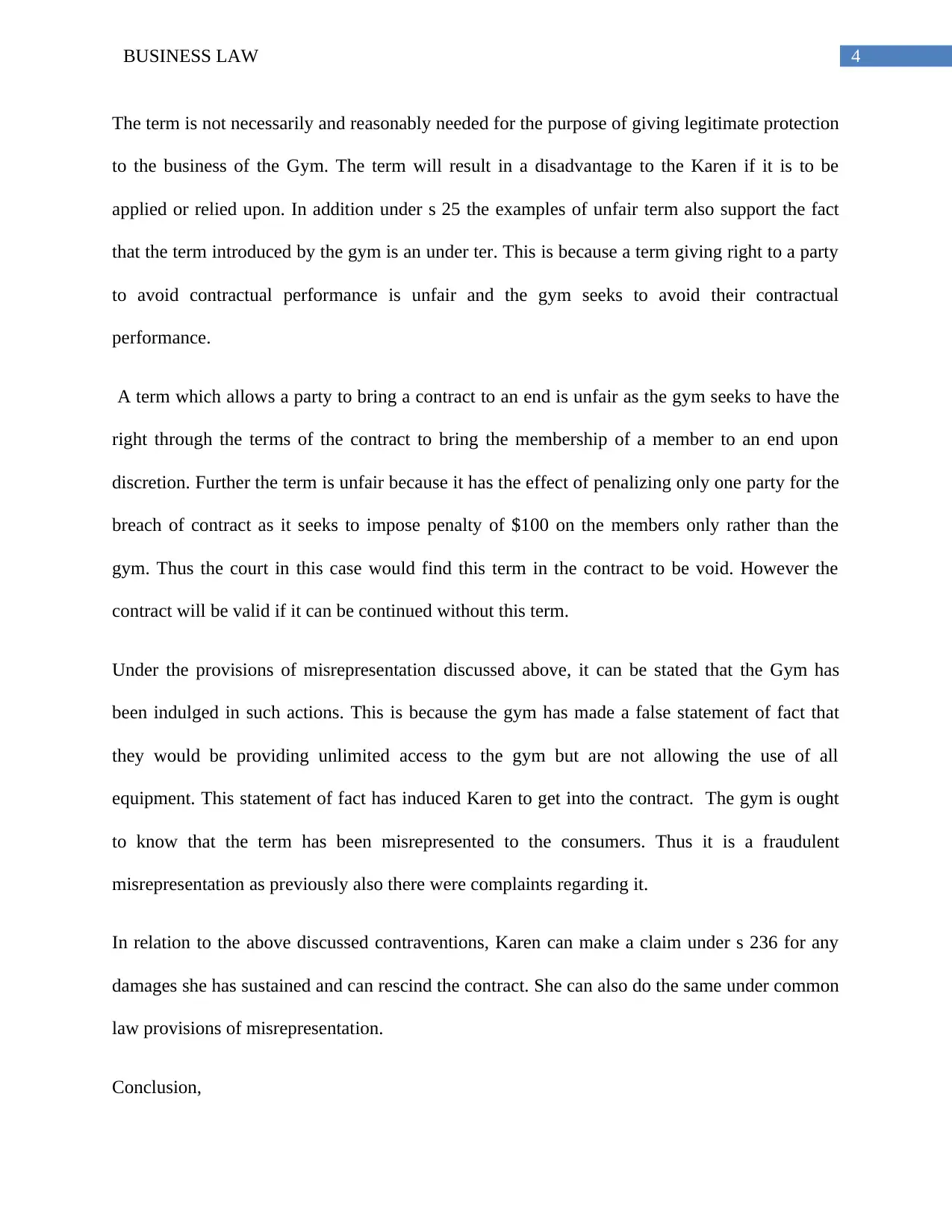
4BUSINESS LAW
The term is not necessarily and reasonably needed for the purpose of giving legitimate protection
to the business of the Gym. The term will result in a disadvantage to the Karen if it is to be
applied or relied upon. In addition under s 25 the examples of unfair term also support the fact
that the term introduced by the gym is an under ter. This is because a term giving right to a party
to avoid contractual performance is unfair and the gym seeks to avoid their contractual
performance.
A term which allows a party to bring a contract to an end is unfair as the gym seeks to have the
right through the terms of the contract to bring the membership of a member to an end upon
discretion. Further the term is unfair because it has the effect of penalizing only one party for the
breach of contract as it seeks to impose penalty of $100 on the members only rather than the
gym. Thus the court in this case would find this term in the contract to be void. However the
contract will be valid if it can be continued without this term.
Under the provisions of misrepresentation discussed above, it can be stated that the Gym has
been indulged in such actions. This is because the gym has made a false statement of fact that
they would be providing unlimited access to the gym but are not allowing the use of all
equipment. This statement of fact has induced Karen to get into the contract. The gym is ought
to know that the term has been misrepresented to the consumers. Thus it is a fraudulent
misrepresentation as previously also there were complaints regarding it.
In relation to the above discussed contraventions, Karen can make a claim under s 236 for any
damages she has sustained and can rescind the contract. She can also do the same under common
law provisions of misrepresentation.
Conclusion,
The term is not necessarily and reasonably needed for the purpose of giving legitimate protection
to the business of the Gym. The term will result in a disadvantage to the Karen if it is to be
applied or relied upon. In addition under s 25 the examples of unfair term also support the fact
that the term introduced by the gym is an under ter. This is because a term giving right to a party
to avoid contractual performance is unfair and the gym seeks to avoid their contractual
performance.
A term which allows a party to bring a contract to an end is unfair as the gym seeks to have the
right through the terms of the contract to bring the membership of a member to an end upon
discretion. Further the term is unfair because it has the effect of penalizing only one party for the
breach of contract as it seeks to impose penalty of $100 on the members only rather than the
gym. Thus the court in this case would find this term in the contract to be void. However the
contract will be valid if it can be continued without this term.
Under the provisions of misrepresentation discussed above, it can be stated that the Gym has
been indulged in such actions. This is because the gym has made a false statement of fact that
they would be providing unlimited access to the gym but are not allowing the use of all
equipment. This statement of fact has induced Karen to get into the contract. The gym is ought
to know that the term has been misrepresented to the consumers. Thus it is a fraudulent
misrepresentation as previously also there were complaints regarding it.
In relation to the above discussed contraventions, Karen can make a claim under s 236 for any
damages she has sustained and can rescind the contract. She can also do the same under common
law provisions of misrepresentation.
Conclusion,
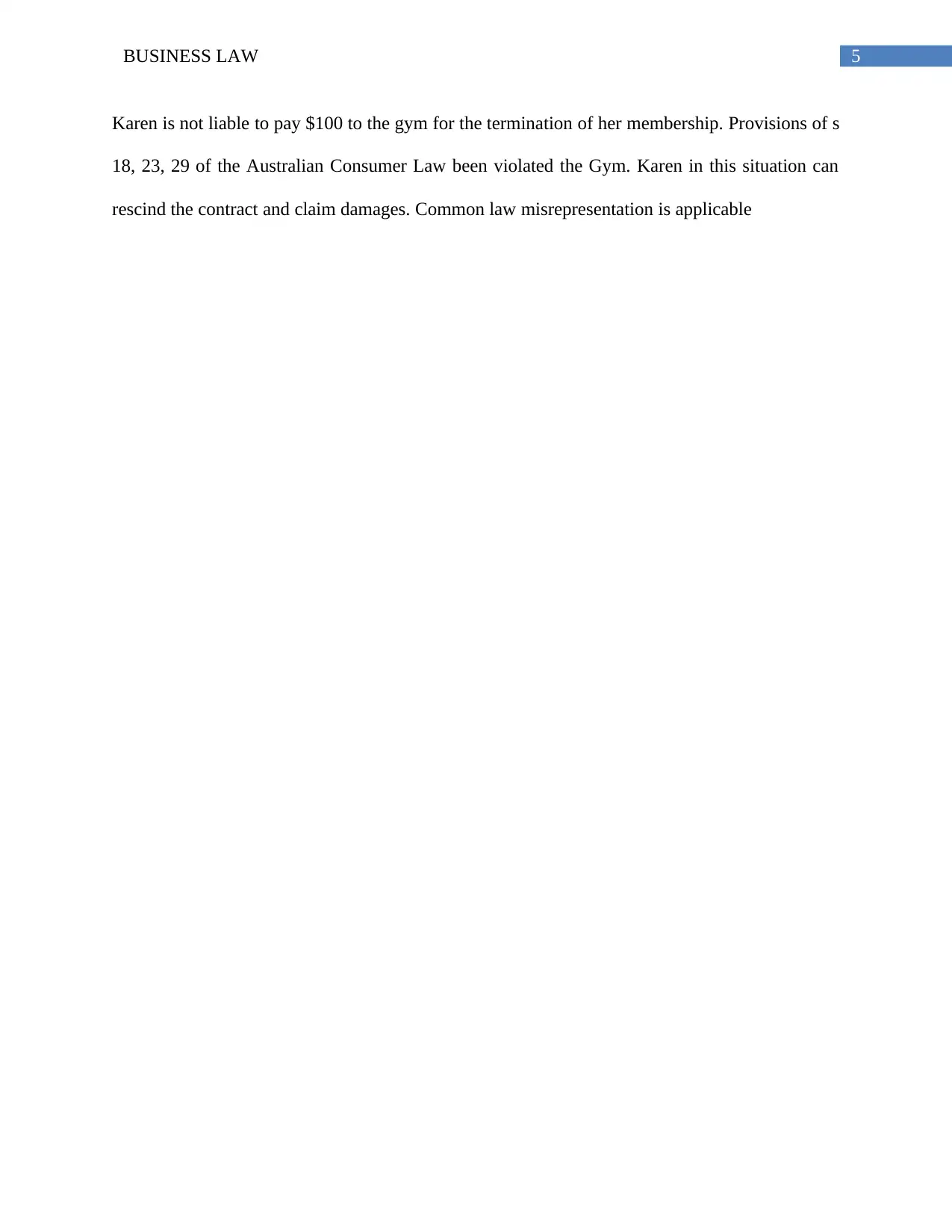
5BUSINESS LAW
Karen is not liable to pay $100 to the gym for the termination of her membership. Provisions of s
18, 23, 29 of the Australian Consumer Law been violated the Gym. Karen in this situation can
rescind the contract and claim damages. Common law misrepresentation is applicable
Karen is not liable to pay $100 to the gym for the termination of her membership. Provisions of s
18, 23, 29 of the Australian Consumer Law been violated the Gym. Karen in this situation can
rescind the contract and claim damages. Common law misrepresentation is applicable
⊘ This is a preview!⊘
Do you want full access?
Subscribe today to unlock all pages.

Trusted by 1+ million students worldwide
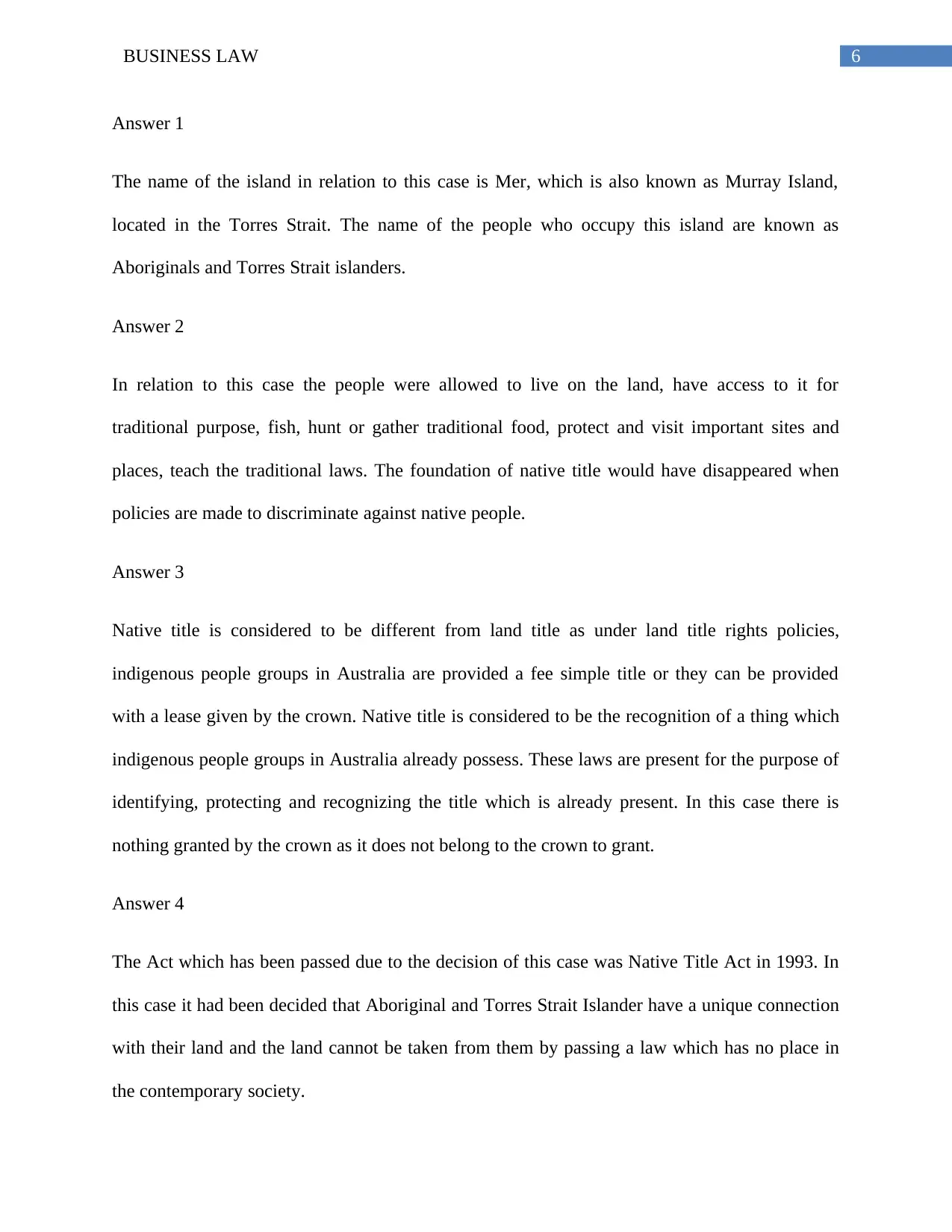
6BUSINESS LAW
Answer 1
The name of the island in relation to this case is Mer, which is also known as Murray Island,
located in the Torres Strait. The name of the people who occupy this island are known as
Aboriginals and Torres Strait islanders.
Answer 2
In relation to this case the people were allowed to live on the land, have access to it for
traditional purpose, fish, hunt or gather traditional food, protect and visit important sites and
places, teach the traditional laws. The foundation of native title would have disappeared when
policies are made to discriminate against native people.
Answer 3
Native title is considered to be different from land title as under land title rights policies,
indigenous people groups in Australia are provided a fee simple title or they can be provided
with a lease given by the crown. Native title is considered to be the recognition of a thing which
indigenous people groups in Australia already possess. These laws are present for the purpose of
identifying, protecting and recognizing the title which is already present. In this case there is
nothing granted by the crown as it does not belong to the crown to grant.
Answer 4
The Act which has been passed due to the decision of this case was Native Title Act in 1993. In
this case it had been decided that Aboriginal and Torres Strait Islander have a unique connection
with their land and the land cannot be taken from them by passing a law which has no place in
the contemporary society.
Answer 1
The name of the island in relation to this case is Mer, which is also known as Murray Island,
located in the Torres Strait. The name of the people who occupy this island are known as
Aboriginals and Torres Strait islanders.
Answer 2
In relation to this case the people were allowed to live on the land, have access to it for
traditional purpose, fish, hunt or gather traditional food, protect and visit important sites and
places, teach the traditional laws. The foundation of native title would have disappeared when
policies are made to discriminate against native people.
Answer 3
Native title is considered to be different from land title as under land title rights policies,
indigenous people groups in Australia are provided a fee simple title or they can be provided
with a lease given by the crown. Native title is considered to be the recognition of a thing which
indigenous people groups in Australia already possess. These laws are present for the purpose of
identifying, protecting and recognizing the title which is already present. In this case there is
nothing granted by the crown as it does not belong to the crown to grant.
Answer 4
The Act which has been passed due to the decision of this case was Native Title Act in 1993. In
this case it had been decided that Aboriginal and Torres Strait Islander have a unique connection
with their land and the land cannot be taken from them by passing a law which has no place in
the contemporary society.
Paraphrase This Document
Need a fresh take? Get an instant paraphrase of this document with our AI Paraphraser
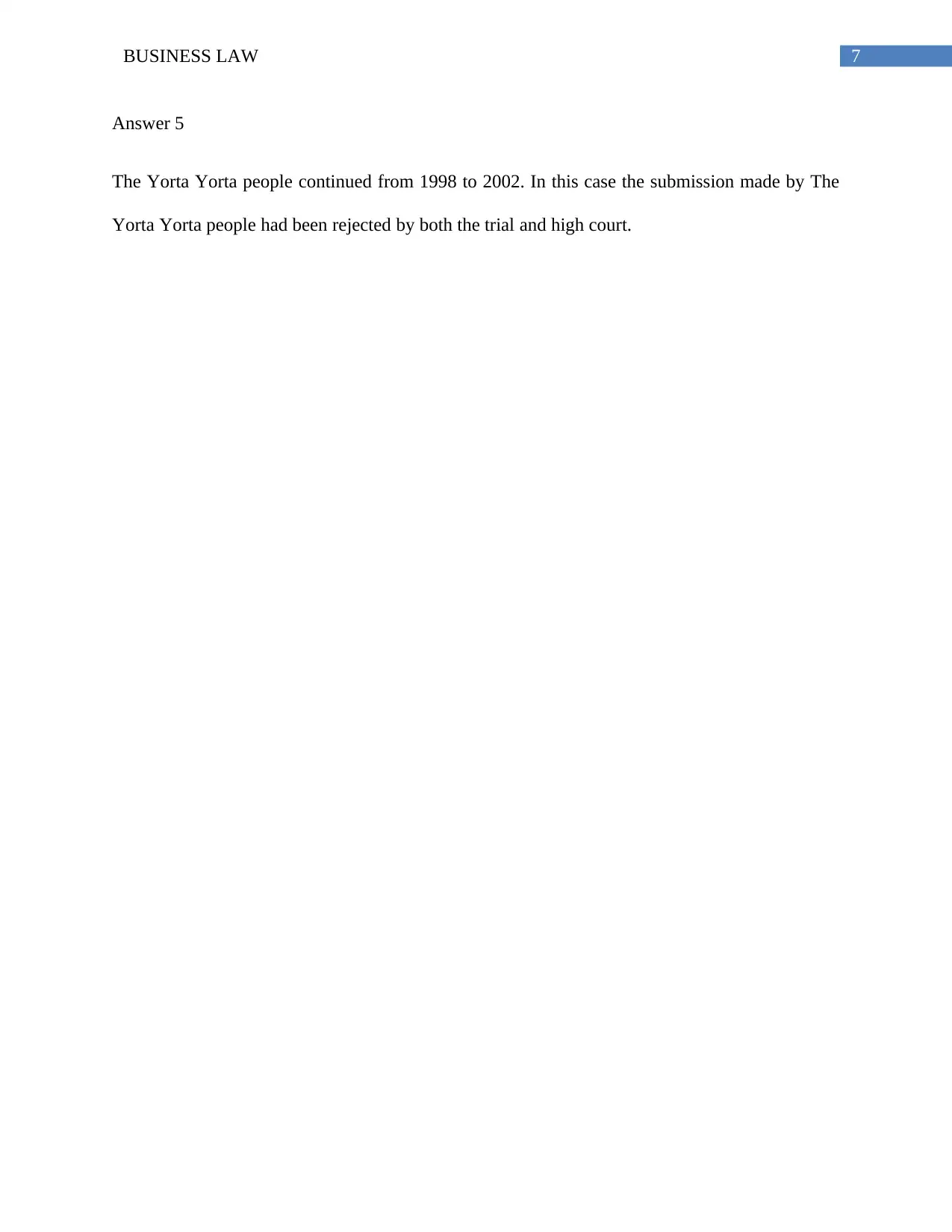
7BUSINESS LAW
Answer 5
The Yorta Yorta people continued from 1998 to 2002. In this case the submission made by The
Yorta Yorta people had been rejected by both the trial and high court.
Answer 5
The Yorta Yorta people continued from 1998 to 2002. In this case the submission made by The
Yorta Yorta people had been rejected by both the trial and high court.
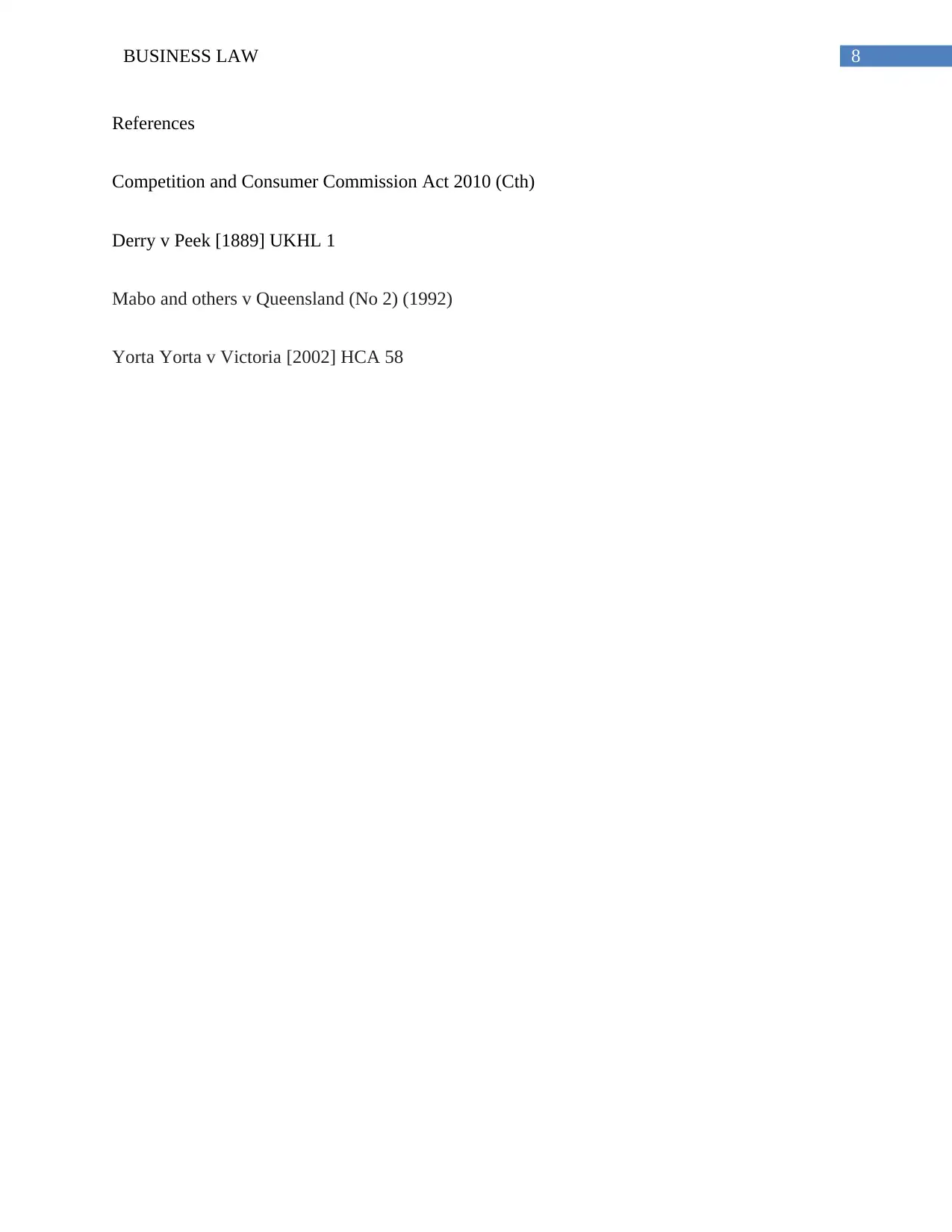
8BUSINESS LAW
References
Competition and Consumer Commission Act 2010 (Cth)
Derry v Peek [1889] UKHL 1
Mabo and others v Queensland (No 2) (1992)
Yorta Yorta v Victoria [2002] HCA 58
References
Competition and Consumer Commission Act 2010 (Cth)
Derry v Peek [1889] UKHL 1
Mabo and others v Queensland (No 2) (1992)
Yorta Yorta v Victoria [2002] HCA 58
⊘ This is a preview!⊘
Do you want full access?
Subscribe today to unlock all pages.

Trusted by 1+ million students worldwide
1 out of 9
Related Documents
Your All-in-One AI-Powered Toolkit for Academic Success.
+13062052269
info@desklib.com
Available 24*7 on WhatsApp / Email
![[object Object]](/_next/static/media/star-bottom.7253800d.svg)
Unlock your academic potential
Copyright © 2020–2026 A2Z Services. All Rights Reserved. Developed and managed by ZUCOL.





